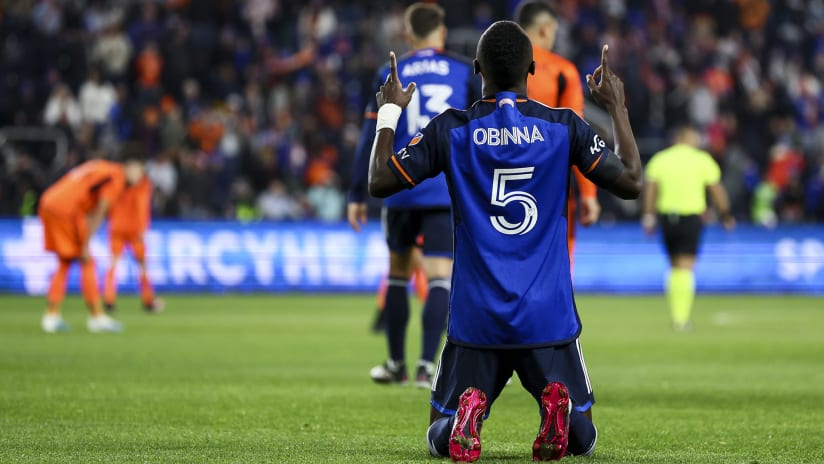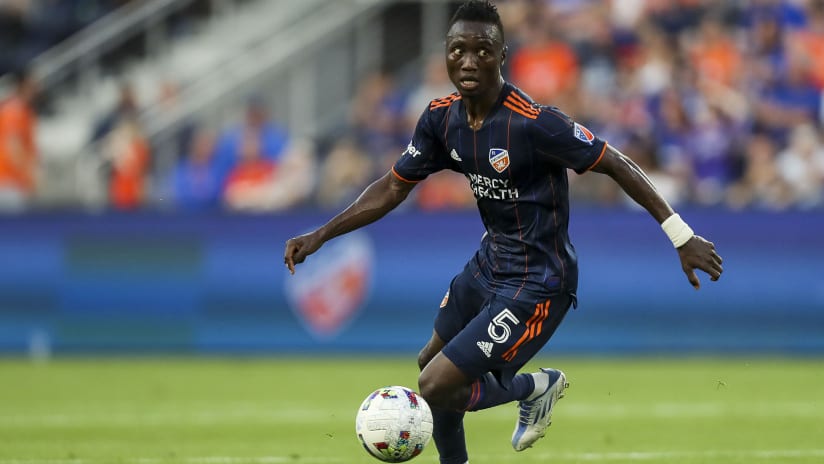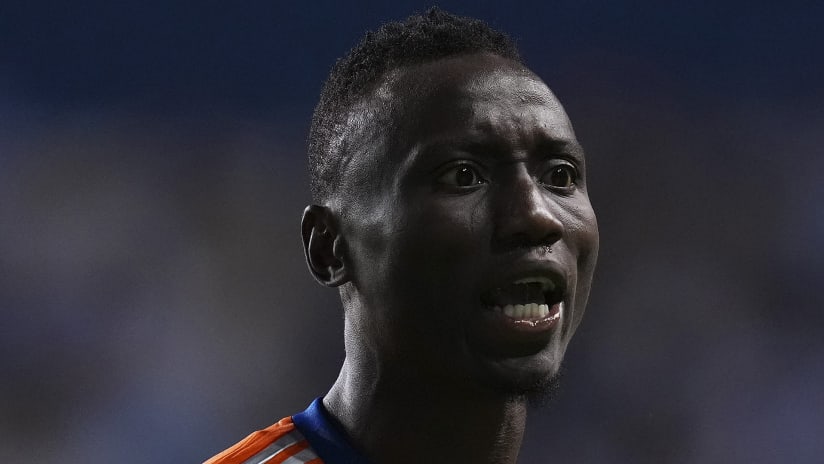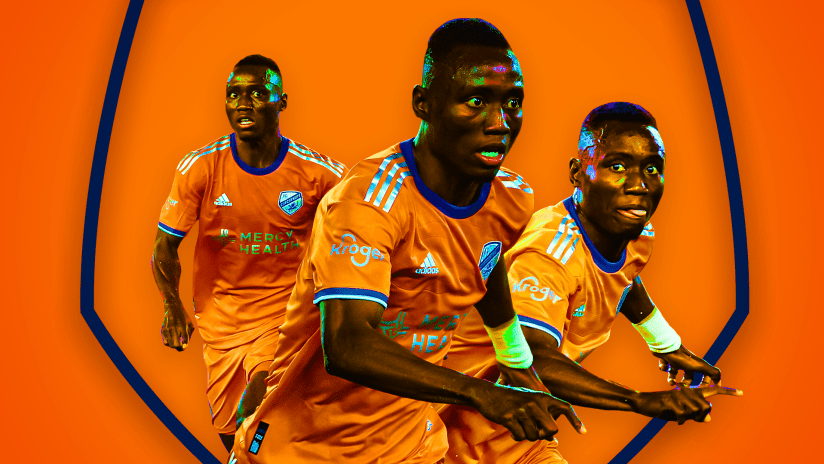Like a parent’s face or a childhood phone number, the memory of a field is stamped in Obinna Nwobodo’s brain. Ask him to describe it, and he’ll paint you a picture with his words.
“It’s really not a good pitch,” recalled the FC Cincinnati midfielder to MLSsoccer.com with a rueful smile at FCC’s preseason base in Clearwater, Florida last month. “Sometimes it’s not even a soccer ball, just something round – any round object that is safe, that is not so strong that it can injure you, we already started kicking it and trying to form teams, like three against three. … Sometimes we are lucky to actually get a soccer ball, sometimes no.
“This pitch is very big, part of it is good grass, but at the center is so rough. Like, if you fell down there, you’re surely going to have a lot of scratches. So most guys, we get injured, we kill our legs – and we're not even using soccer shoes, we’re playing with bare feet.”
Even if you had access to the right footwear, Nwobodo explains, the eagerness to play – and demand for a place on the hard-packed dirt – was such that a snippet of the sights and sounds of a pickup game often sent him and his fellow children racing out there without them.
“Anytime you hear this noise, there's no time to go and find shoes – just step out and then we start playing,” he said with a laugh. “So that's how I can remember this field, this pitch. It’s still there, by the police barracks. It’s always there.
“My dad was a police officer,” the 26-year-old continued. “So we lived in the barracks. So there we have the pitch at the center of this barracks. The houses was around the pitch. So coming in from anywhere, you walk past the pitch. You're going out, you’re walking past it. It’s always there. At night, in the morning, every time, it’s always there.”
The foundation
In the southeastern Nigerian city of Enugu, where Nwobodo grew up, soccer is everything: recreation, relief, passion, obsession, and for the blessed few who shine brightly enough to make a career of it, a rescue from the struggles of a life where poverty is always lurking around the corner for all but the elite.
Their father’s law enforcement career provided some respite from that for Obinna and his five brothers and sisters. Yet the stability eroded when Innocent Nwobodo took ill and passed away early in Obinna’s childhood, even with policies allowing widows and survivors to remain in police housing. Keeping the family on course was a massive, endless undertaking for his mother, Teresa, and his older siblings entered the workforce early to help make ends meet.
Obinna did his part around the house and paid keen attention to his schoolwork. But that pitch was always close at hand, exerting a magnetic pull.
“From my home, I open the window, I always see first if anyone is playing,” said the defensive midfielder who’s had such a transformative effect on FCC since his arrival last year. “If the kids are out, I always see them, and I will never be comfortable sitting down. Any time I hear the sound of these guys playing, I always try to find a way. Or maybe I'm doing something, like the house chores or stuff, always go quick, and try to get permission to go, so I'm always either the first or the second in this pitch."

This was the spot where his future as a footballer was formed. He spent precious little time on other fields across Nigeria as a youth, considering he would later be selected for the Under-20 national team to represent his country at the 2015 African U-20 Championship.
That’s in large part because Teresa was fiercely protective of her second-youngest child when his abilities began to draw attention, first in the form of invitations to represent his school, and later Enugu State, in regional competition.
“My mom didn't allow me to go, as I was very young,” Obinna explained. “I was playing with the older ones, so once it has to do with travel, I don't travel. … The older footballers come to ask her, to say she should leave me to go, but she's not comfortable. She said that [because] I'm playing with them doesn't mean I'm the same age with them, so she wouldn't trust them when we travel. She wouldn't be able to see what's going on. So it was a little bit difficult.
“I was very, very young when my dad died … that's why she always tried to protect me, to find a way to make sure that she did her own part.”
So Obinna stayed on that barracks pitch. Even when the youth national teams came calling as he moved through adolescence, education took priority.
“I started seeing that, OK, now I can actually be a professional player if I continue,” said Nwobodo. “It's just coming to my head that, hey, I have an opportunity if I keep going. So from then I was picked also to go to Nigeria Under-17, Under-16 national team.
“I didn't go, because I needed to finish my school, my high school. My mom, she wouldn't want anything to stop me from finishing these classes.”

Cincy take notice
Years later, Cincy general manager Chris Albright got a glimpse of that diligence in the face of keen adversity when he and head coach Pat Noonan were recruiting Nwobodo to join their rebuilding project at a club that had just begun its life in MLS with three straight wooden-spoon seasons.
“We go through the whole sales pitch, and Pat's talking about style of play, and I'm talking about the club and the opportunity and our infrastructure and ownership. We throw all this stuff at him,” Albright told MLSsoccer.com, “and I was like, do you have any questions?
“And he's like, ‘Yeah, I have one.’ OK? He said, ‘I often like to do training on my own outside of normal practices, and would you guys be able to provide me the gear for when I want to do training on my own?’ So there you go, right? It speaks to the humble beginnings. And I'm trying to explain to him, Obi, you're going to be a Designated Player. One, you can probably afford the gear, but we'll make sure you'll be well taken care of when you want to train on your own.”
As it happened, both Obinna’s life and his mother’s permission pivoted on a single game: When his youth team played a preseason friendly vs. professional club Enugu Rangers, and the youngster turned in a man-of-the-match performance.
“After this game, they said they're not going to let me go back,” said Nwobodo. “They signed me.”
He’d made sure to complete his JS5 final exam a year ahead of schedule, so mom didn’t have to sweat school like before. In a matter of months he became the engine for a Rangers side that won the club’s first Nigeria Premier League title in three decades, qualifying for the CAF Champions League and drawing eyes further afield to his vision, tenacity and relentless work rate. A move abroad to Hungarian club Újpest soon followed, and later to Turkish side Göztepe SK. That’s where Nwobodo moved onto Cincinnati’s radar.
Kyle McCarthy, FCC’s director of strategic soccer planning, built a data profile on Nwobodo that showed him to be a ball-winner extraordinaire, a tireless terrier whose underlying numbers were “off the charts,” reminiscent of José “El Brujo” Martínez, the No. 6 he and Albright had found in Venezuela while working together at Philadelphia Union. And the eye test showed Albright that Nwobodo was rich in what he calls “the care factor,” too.
“He doesn't ever think a play’s over,” Albright said of Nwobodo. “When we were scouting him, there was one clip where we watched him go try to win a ball, and he missed out on it. And then his teammate missed out on sort of the next play, and he chases this guy like 85 yards, and he has no business catching him. And then you look up, and it's like, the 89th minute, and I think they were losing 2-0. So in essence, the play didn't matter, but it mattered to him. And they all matter to him. I think that's what separates him. It's just a different desire to want to affect the game.”
That eagerness to do the dirty work isn’t always easy to spot or measure. You could see it in Cincy’s impressive Matchday 3 win over Seattle, though, where Nwobodo pressed high up to strip Sounders star Nico Lodeiro and spark a quick transition for Brenner’s goal in the taut 1-0 victory.
Nwobodo himself traces that hunger back to that pitch in Enugu, where crowded games made him hustle to win possession, to earn the right to express himself on the ball. It’s made FCC dramatically more difficult to play against since his arrival in April 2022, raising the ceiling for Noonan’s Orange & Blue renaissance.
“That was the most important piece for us, just positionally, to address early on. There wasn't a ball winner on the roster,” noted Albright. “He's changed a lot about how we are able to play, and a lot about just how he trains as well, just the standard he sets every day. Some days, you have to remind him, ‘Obi, this is a Tuesday training session, not MLS Cup.’ That's how he's wired.”

Playoff contender?
If you haven’t already guessed it, Nwobodo is exceedingly humble, a quiet, unassuming presence off the pitch belying his controlled ferocity on it. He’s made this strong first impression in southern Ohio with family still far away: His wife and their young son remain in Nigeria, still waiting on US immigration clearance nearly a year after his signing.
He’s eager to speed Cincinnati’s push up the MLS pecking order, and after navigating a mountain of US government paperwork, hopes Teresa can soon make her first Stateside visit to witness it in person – even if she has a tendency to worry when watching him play, always fretting that he’ll get injured. If they continue their current trajectory, perhaps mom will have the chance to take in another run in the Audi 2023 MLS Cup Playoffs.
“This is the standard we set for ourselves last year, so this year nothing less is expected,” said Nwobodo. “We just need to keep the standard and even raise it more.
“This is the structure that we are building – or that we built, and we are already standing on it. So we have a lot of things this year to prove, because we have to show that we did it last year, we can always do it again. And this is where we want to put the team, to always go higher, not to go and come down. So we need to realize a lot of responsibility for the whole team now.”











